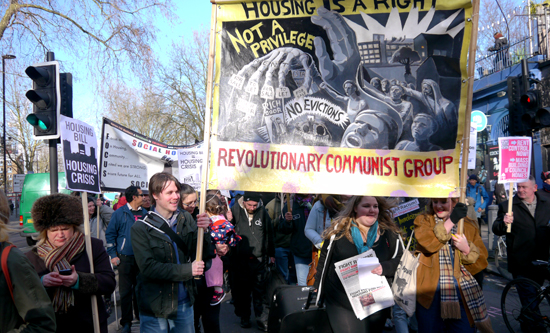
(Banner produced by Andrew Cooper https://andrewcooper-unseen.org)
The Conservative government has declared open warfare on decent, affordable, secure housing for the working class. In January 2016 Prime Minister David Cameron launched the latest salvo in this onslaught with a blistering attack on council housing. His description of working class estates as ‘concrete blocks dropped from on high … dark alleyways that are a gift to criminals and drug dealers’ paves the way for wholesale demolition and privatisation (see ‘Blitzkrieg: sink estates and starter homes’, p9). But there is no point hoping the Labour Party will oppose this social cleansing. On the contrary – it was Labour’s Lord Adonis who, in March 2015, provided its ideological framework. In a report for the Institute for Public Policy Research (IPPR), the Labour peer called for the demolition of working class estates across London – built on ‘some of the highest-priced land in the world’ – and their replacement by ‘market-priced rent developments’. Crucially, he recategorises such estates as ‘brownfield sites’ – ripe for demolition and development, contemptuously ignoring the fact that these are the homes of thousands of working class people. Cat Alison reports.
When Cameron went on to say that the rights of existing tenants will be respected, he was lying. One has only to look at another section of the IPPR report written by Peter John OBE, Labour leader of Southwark council in south London. Enthusiastically endorsing Adonis’s proposals, he cites the redevelopment of Elephant & Castle as an example of the brave new world they mean to build: one of shiny towers containing zero ‘affordable housing’, even on the laughable redefinition of ‘affordable’ as 80% of market rent. As part of the ‘redevelopment’, nearby Heygate Estate, once containing over 1,000 council homes, was razed to the ground to provide a high-density development of flats for exorbitant private sale, shared ownership and private rent. Just 74 units will be ‘affordable’ – there will be no more council housing. This is the shape of things to come.
Where are people to live?
The Housing Bill meanwhile will ensure the rapid sell-off of housing association socially-rented stock, while also forcing councils to sell off their properties. Security of tenure is to end.
Working class people will be forced into an overpriced and insecure private sector, increasing the profits of buy-to-let landlords. Soaring London rents mean that in 20 out of 32 boroughs rent already eats up more than 50% of average earnings; in some boroughs such as Southwark, Lambeth and Wandsworth the figure is over 60%. Again, where is the serious opposition from the Labour Party?
Its London mayoral candidate Sadiq Khan, while mouthing his opposition to the Housing Bill, seems mainly concerned about its impact on ‘those trying to get on the housing ladder’. Meanwhile, politicians voted down an amendment to the bill that would have required landlords to ensure that housing is fit for human habitation! Not surprising perhaps when you consider that 39% of Conservative MPs – including Prime Minister David Cameron, Chancellor George Osborne and Housing Minister Brandon Lewis – are themselves private landlords.
Recent government statistics show that homelessness has risen by a third since 2010. The number of people becoming homeless because of the ending of an assured shorthold tenancy has risen an astronomical 154%, for the first time outstripping the number evicted because of rent arrears. When the reduced benefit cap comes into effect in April, that figure will rise exponentially. Estimates for the number affected range from 100,000 households with around 350,000 children (Citizens Advice) to 200,000 households with 654,000 children (housing campaigner Joe Halewood at speye.wordpress.com). Soon not just London, the southeast and big cities like Manchester and Birmingham, but also areas not traditionally associated with high housing costs such as Coventry, Liverpool, Peterborough and Ipswich, will become unaffordable for a two-parent family with two young children sharing a room. Single parents will be disproportionately affected, especially in London.
In addition, a nasty bit of policy slipped into the Chancellor’s Autumn statement in November means that almost all refuges and housing for an estimated 156,000 vulnerable people will close (speye.wordpress.com). New regulations dictate that no form of housing can receive more in housing benefit than the Local Housing Allowance (LHA) rate applicable in the private sector. There are, for example, roughly 36,000 bed places for single homeless people across the country, average rent £180 a week. But the single LHA room rate is on average £111 a week (£67 for those under 35) – so that is the maximum that will now be paid in housing benefit. The government says it is providing councils with an extra £35m to cover a shortfall which could be, on Halewood’s calculations, anything between £130m and £230m. This so-called ‘LHA maxima’ policy will also devastate domestic violence refuges, specialist supported housing for those with mental health, learning, physical and sensory disabilities or brain injuries, sheltered accommodation for the elderly and just about any other vulnerable group you can think of. Mencap’s housing partner, Golden Lane Housing, has been forced to scrap plans to invest £100m over five years in building supported housing. Inside Housing (21 January 2016) estimates that 95% of all supported housing provision for vulnerable people will be forced to close.
No one, it seems, is too young or too old, too sick or too vulnerable or too disabled, to be spared the threat of homelessness if they are working class and poor. We have no option but to resist. The time to fight back is now.
Fight Racism! Fight Imperialism! 249 February/March 2016




